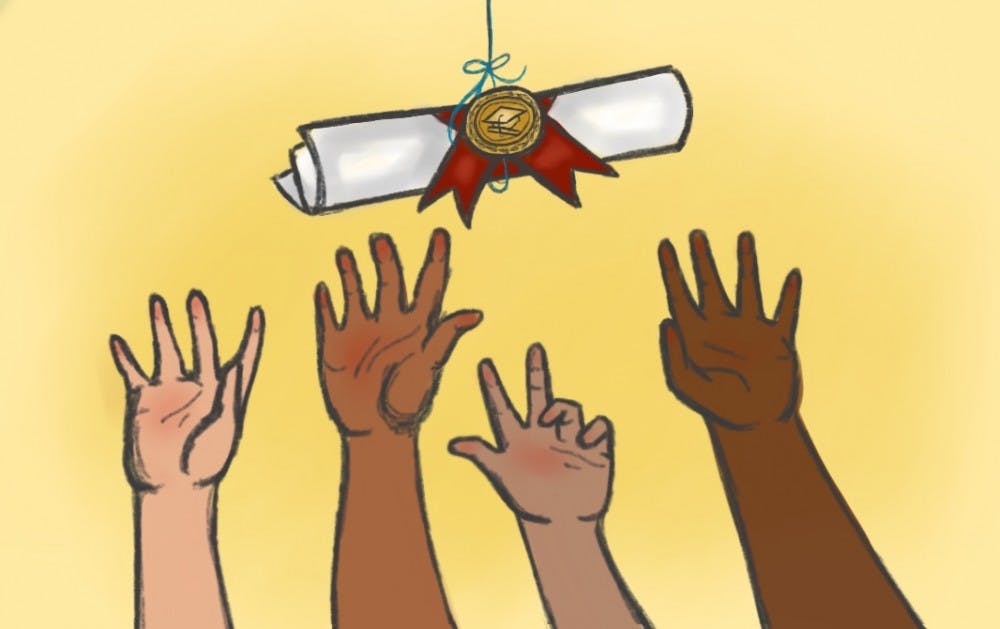As ASU students face yet another increase in their annual tuition, it can become more difficult for them to stay afloat in a rising pool of costs.
A 2017 study analyzed by The New York Times found that of Arizona's three major universities only about 6% of their combined student populations came from the lowest economic demographic. This demographic covers people who make $20,000 or less per year.
This struggling portion of the ASU student body is virtually ignored by the University.
The University is not providing enough resources such as assistance with tuition and other school related fees. Low-income students deserve to have access to the same resources that wealthier students may already have or could easily obtain.
President Michael Crow did not acknowledge the 6% of lower-income students from the 2017 study in his Arizona Republic guest opinion, where he defended the cost of ASU.
This comes after a lawsuit from Arizona Attorney General Mark Brnovich, who argued that the cost of ASU was going against a principle in the Arizona Constitution that in-state universities must be "as nearly free as possible."
READ MORE: University tuition increases, overhaul receive criticism from students
“I feel like the wealthier students always get more opportunities ... even though they already come from money," said MaryKelly Starrs, a junior studying global health.
Access to funds is a growing issue in the realm of financial aid: More is going to wealthy students as opposed to those who may not have an economic safety net.
Inequality among students is also known to generate high levels of stress and mental illness.
“Low-income students generally do have higher rates of mental health problems," Starrs said. "We’re worrying about money, financing certain things ... being able to afford books. That really makes you depressed. Sometimes we have to power through that.”
While some on-campus federally funded programs such as TRIO exist to help low-income students, the programs do not provide enough assistance. These programs do not cover major costs like parking, housing and books.
For students who have to take out thousands of dollars in loans, the extra burden of paying the national average of $153 in books per course is a heavy weight to carry. According to The College Board, the average full-time undergraduate student has to spend about $1,300 a year on books and other supplies not included in tuition.
“I’ve wanted to take classes really badly, but I had to drop them before the semester started because I saw the amount of books that it required," Starrs said. "The college could easily provide those books."
Altogether this leaves the most underserved populations susceptible to falling through the cracks.
The White House even admitted that “low-income students often lack the guidance and support they need to prepare for college ... apply for financial aid, enroll and persist in their studies and ultimately graduate.”
As a low-income student, I've had nearly my entire education subsidized by federal aid.
Still there are impediments due to my socioeconomic status that keep me from achieving success. This is not equality: federal aid is not enough.
This lack of acknowledgment of the struggles faced by ASU students can make or break their future.
Students are placed into tuition brackets, in-state, out-of-state and international without enough consideration of the economic situation.
Charging each block the same market price without enough consideration of their economic situation deepens their struggle and affects them not only in the academic realm but personally.
Struggling students need these vital academic resources and should be given access to additional programs in order for them to succeed in comparison to their wealthier counterparts.
Reach the columnist at amisais@asu.edu or follow @comradealexia on Twitter.
Editor’s note: The opinions presented in this column are the author’s and do not imply any endorsement from The State Press or its editors.
Want to join the conversation? Send an email to opiniondesk.statepress@gmail.com. Keep letters under 500 words and be sure to include your university affiliation. Anonymity will not be granted.
Like The State Press on Facebook and follow @statepress on Twitter.




